BMP4006 - BUNI Travel: People Management, Performance, and Wellbeing
VerifiedAdded on 2023/06/18
|9
|2682
|208
Report
AI Summary
This report examines how BUNI Travel, a local travel agent in Bolton, can improve its organisational performance through effective people management and Human Resource Management (HRM) tools. It discusses techniques like 360-degree feedback, Management by Objectives (MBO), and performance appraisals. The report also highlights the importance of employee wellbeing, focusing on productivity, achieving objectives, work-life balance, and flexible work arrangements. Furthermore, a PESTLE analysis is conducted to assess the impact of external political, economic, social, technological, legal, and environmental factors on BUNI Travel's operations and strategic planning. The aim is to provide insights and recommendations for the new HR Manager to reshape the people function, enhance staff performance, and boost motivation within the company. This document is available on Desklib, a platform offering a range of study tools and solved assignments for students.
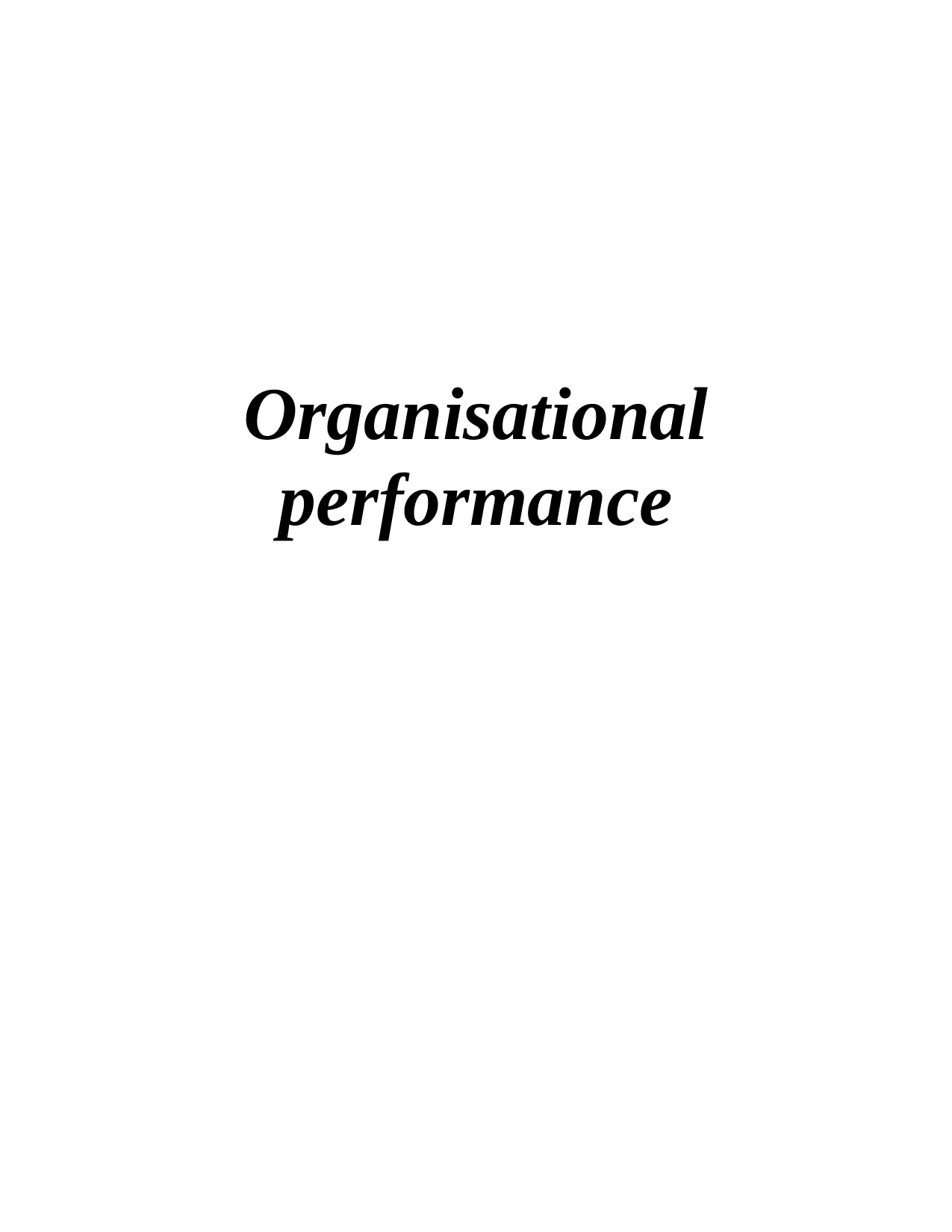
Organisational
performance
performance
Paraphrase This Document
Need a fresh take? Get an instant paraphrase of this document with our AI Paraphraser
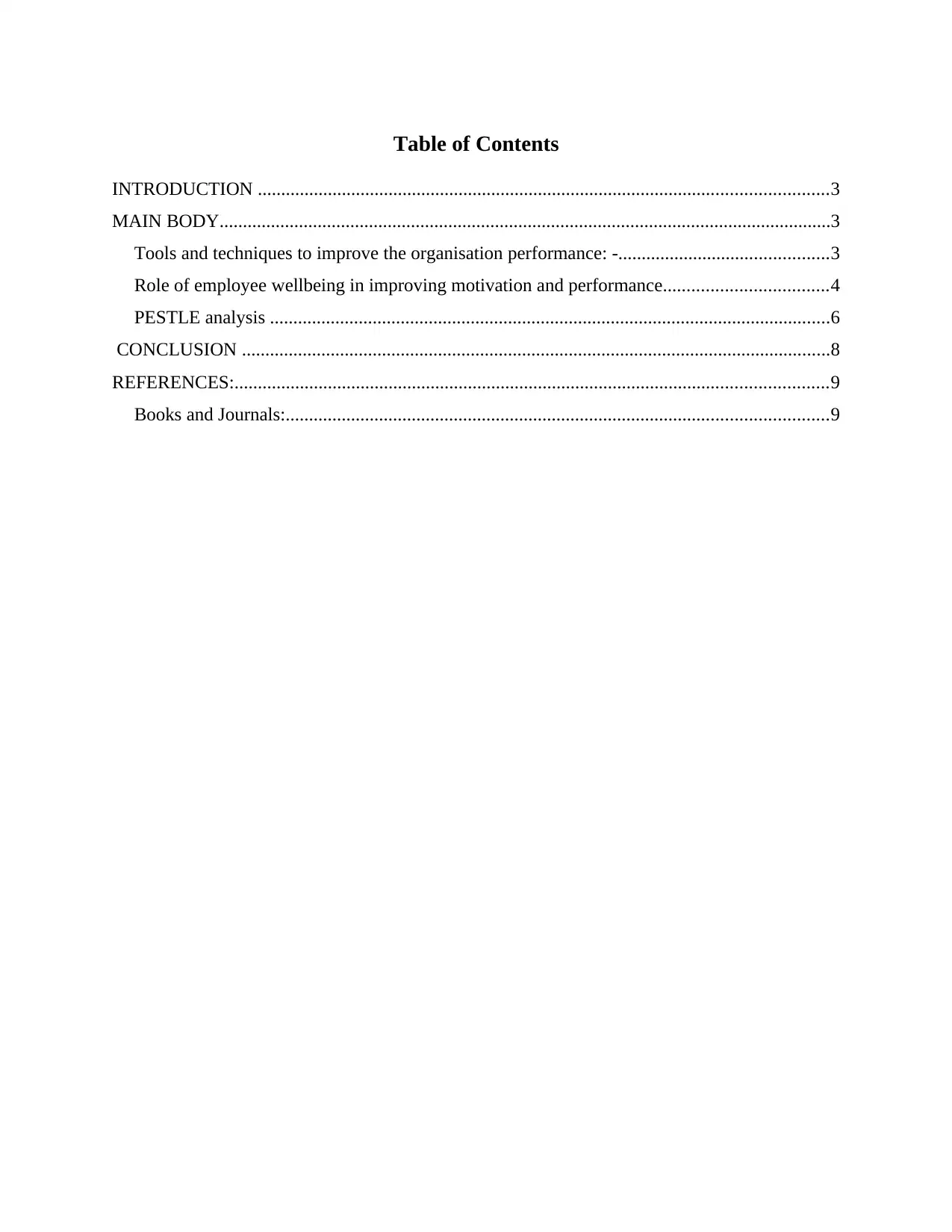
Table of Contents
INTRODUCTION ..........................................................................................................................3
MAIN BODY...................................................................................................................................3
Tools and techniques to improve the organisation performance: -.............................................3
Role of employee wellbeing in improving motivation and performance...................................4
PESTLE analysis ........................................................................................................................6
CONCLUSION ..............................................................................................................................8
REFERENCES:...............................................................................................................................9
Books and Journals:....................................................................................................................9
INTRODUCTION ..........................................................................................................................3
MAIN BODY...................................................................................................................................3
Tools and techniques to improve the organisation performance: -.............................................3
Role of employee wellbeing in improving motivation and performance...................................4
PESTLE analysis ........................................................................................................................6
CONCLUSION ..............................................................................................................................8
REFERENCES:...............................................................................................................................9
Books and Journals:....................................................................................................................9
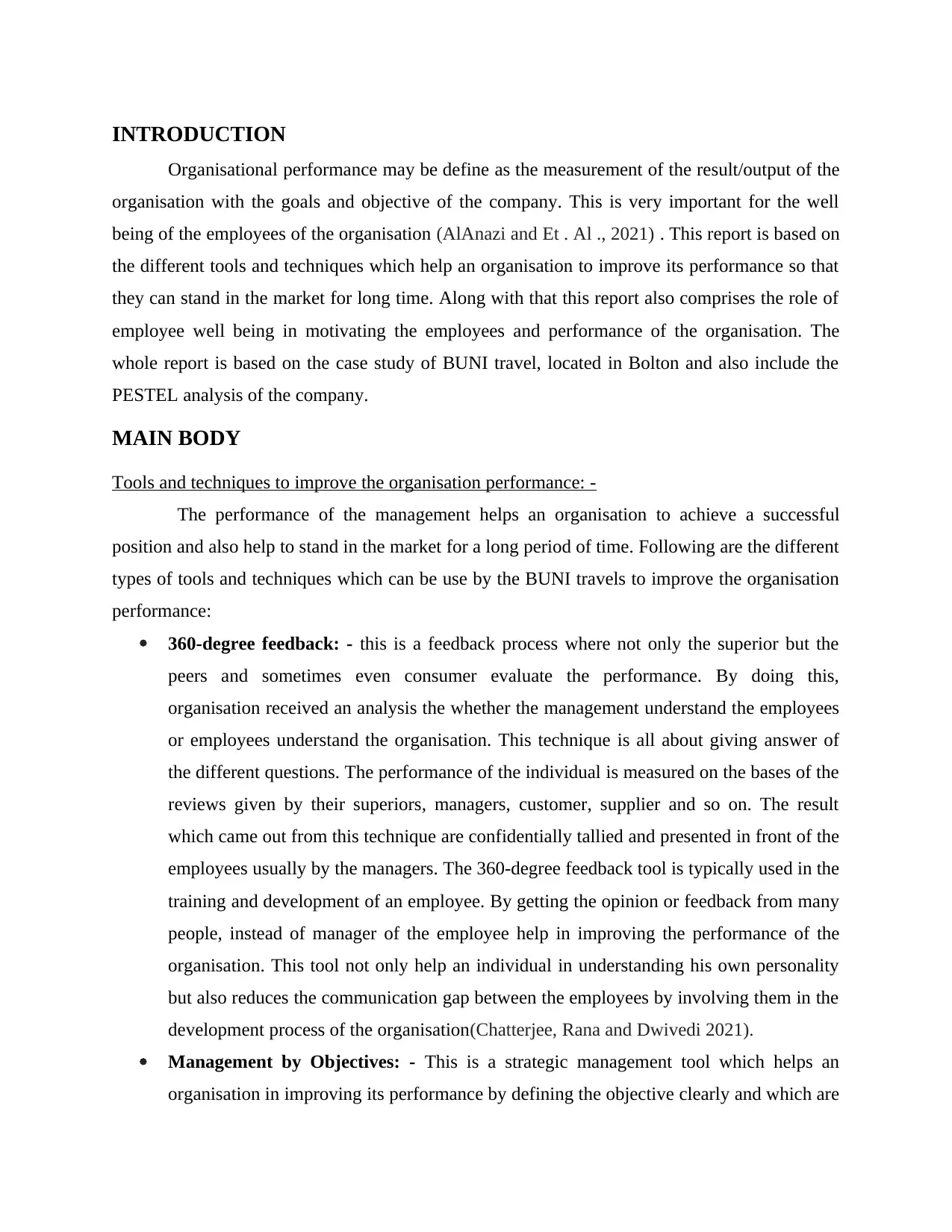
INTRODUCTION
Organisational performance may be define as the measurement of the result/output of the
organisation with the goals and objective of the company. This is very important for the well
being of the employees of the organisation (AlAnazi and Et . Al ., 2021) . This report is based on
the different tools and techniques which help an organisation to improve its performance so that
they can stand in the market for long time. Along with that this report also comprises the role of
employee well being in motivating the employees and performance of the organisation. The
whole report is based on the case study of BUNI travel, located in Bolton and also include the
PESTEL analysis of the company.
MAIN BODY
Tools and techniques to improve the organisation performance: -
The performance of the management helps an organisation to achieve a successful
position and also help to stand in the market for a long period of time. Following are the different
types of tools and techniques which can be use by the BUNI travels to improve the organisation
performance:
360-degree feedback: - this is a feedback process where not only the superior but the
peers and sometimes even consumer evaluate the performance. By doing this,
organisation received an analysis the whether the management understand the employees
or employees understand the organisation. This technique is all about giving answer of
the different questions. The performance of the individual is measured on the bases of the
reviews given by their superiors, managers, customer, supplier and so on. The result
which came out from this technique are confidentially tallied and presented in front of the
employees usually by the managers. The 360-degree feedback tool is typically used in the
training and development of an employee. By getting the opinion or feedback from many
people, instead of manager of the employee help in improving the performance of the
organisation. This tool not only help an individual in understanding his own personality
but also reduces the communication gap between the employees by involving them in the
development process of the organisation(Chatterjee, Rana and Dwivedi 2021).
Management by Objectives: - This is a strategic management tool which helps an
organisation in improving its performance by defining the objective clearly and which are
Organisational performance may be define as the measurement of the result/output of the
organisation with the goals and objective of the company. This is very important for the well
being of the employees of the organisation (AlAnazi and Et . Al ., 2021) . This report is based on
the different tools and techniques which help an organisation to improve its performance so that
they can stand in the market for long time. Along with that this report also comprises the role of
employee well being in motivating the employees and performance of the organisation. The
whole report is based on the case study of BUNI travel, located in Bolton and also include the
PESTEL analysis of the company.
MAIN BODY
Tools and techniques to improve the organisation performance: -
The performance of the management helps an organisation to achieve a successful
position and also help to stand in the market for a long period of time. Following are the different
types of tools and techniques which can be use by the BUNI travels to improve the organisation
performance:
360-degree feedback: - this is a feedback process where not only the superior but the
peers and sometimes even consumer evaluate the performance. By doing this,
organisation received an analysis the whether the management understand the employees
or employees understand the organisation. This technique is all about giving answer of
the different questions. The performance of the individual is measured on the bases of the
reviews given by their superiors, managers, customer, supplier and so on. The result
which came out from this technique are confidentially tallied and presented in front of the
employees usually by the managers. The 360-degree feedback tool is typically used in the
training and development of an employee. By getting the opinion or feedback from many
people, instead of manager of the employee help in improving the performance of the
organisation. This tool not only help an individual in understanding his own personality
but also reduces the communication gap between the employees by involving them in the
development process of the organisation(Chatterjee, Rana and Dwivedi 2021).
Management by Objectives: - This is a strategic management tool which helps an
organisation in improving its performance by defining the objective clearly and which are
⊘ This is a preview!⊘
Do you want full access?
Subscribe today to unlock all pages.

Trusted by 1+ million students worldwide
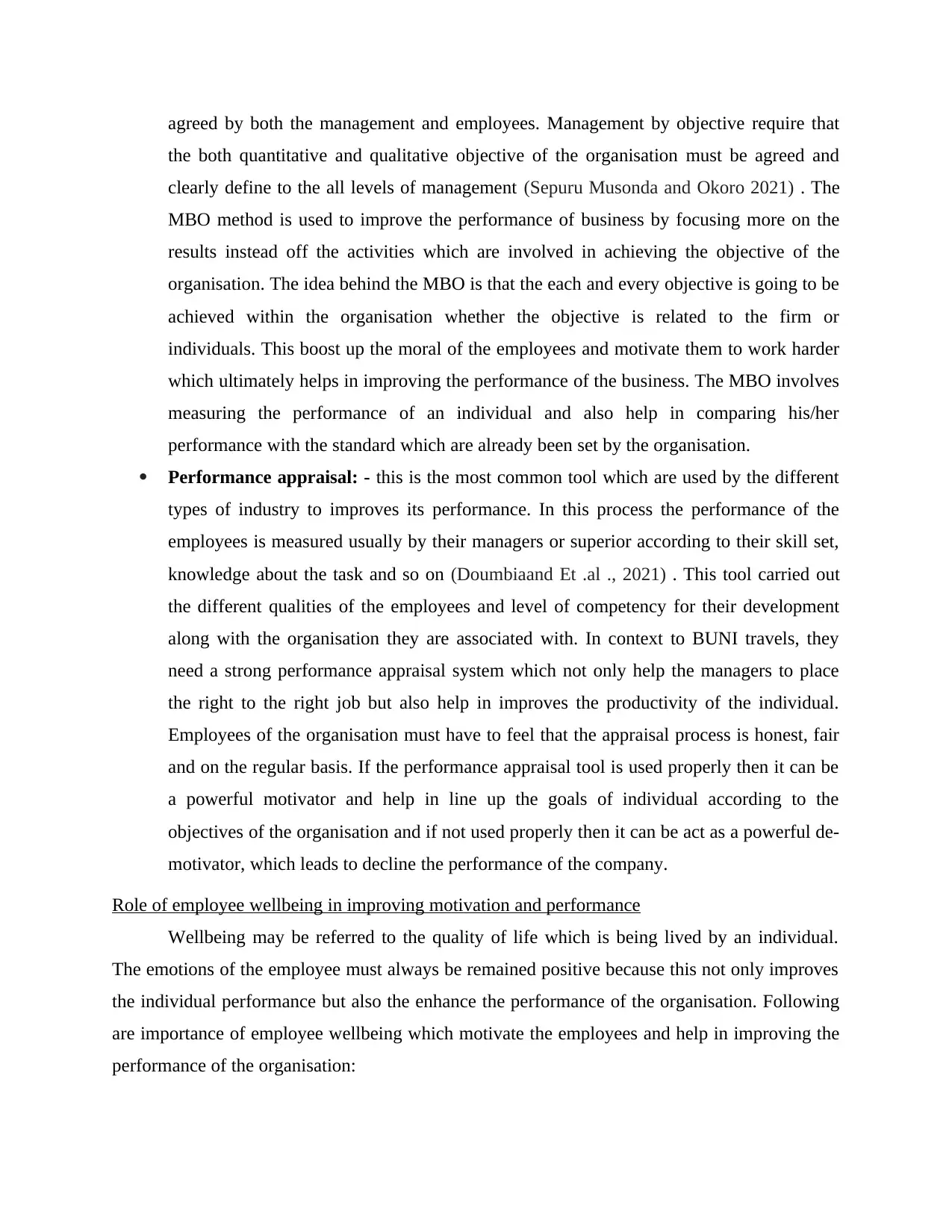
agreed by both the management and employees. Management by objective require that
the both quantitative and qualitative objective of the organisation must be agreed and
clearly define to the all levels of management (Sepuru Musonda and Okoro 2021) . The
MBO method is used to improve the performance of business by focusing more on the
results instead off the activities which are involved in achieving the objective of the
organisation. The idea behind the MBO is that the each and every objective is going to be
achieved within the organisation whether the objective is related to the firm or
individuals. This boost up the moral of the employees and motivate them to work harder
which ultimately helps in improving the performance of the business. The MBO involves
measuring the performance of an individual and also help in comparing his/her
performance with the standard which are already been set by the organisation.
Performance appraisal: - this is the most common tool which are used by the different
types of industry to improves its performance. In this process the performance of the
employees is measured usually by their managers or superior according to their skill set,
knowledge about the task and so on (Doumbiaand Et .al ., 2021) . This tool carried out
the different qualities of the employees and level of competency for their development
along with the organisation they are associated with. In context to BUNI travels, they
need a strong performance appraisal system which not only help the managers to place
the right to the right job but also help in improves the productivity of the individual.
Employees of the organisation must have to feel that the appraisal process is honest, fair
and on the regular basis. If the performance appraisal tool is used properly then it can be
a powerful motivator and help in line up the goals of individual according to the
objectives of the organisation and if not used properly then it can be act as a powerful de-
motivator, which leads to decline the performance of the company.
Role of employee wellbeing in improving motivation and performance
Wellbeing may be referred to the quality of life which is being lived by an individual.
The emotions of the employee must always be remained positive because this not only improves
the individual performance but also the enhance the performance of the organisation. Following
are importance of employee wellbeing which motivate the employees and help in improving the
performance of the organisation:
the both quantitative and qualitative objective of the organisation must be agreed and
clearly define to the all levels of management (Sepuru Musonda and Okoro 2021) . The
MBO method is used to improve the performance of business by focusing more on the
results instead off the activities which are involved in achieving the objective of the
organisation. The idea behind the MBO is that the each and every objective is going to be
achieved within the organisation whether the objective is related to the firm or
individuals. This boost up the moral of the employees and motivate them to work harder
which ultimately helps in improving the performance of the business. The MBO involves
measuring the performance of an individual and also help in comparing his/her
performance with the standard which are already been set by the organisation.
Performance appraisal: - this is the most common tool which are used by the different
types of industry to improves its performance. In this process the performance of the
employees is measured usually by their managers or superior according to their skill set,
knowledge about the task and so on (Doumbiaand Et .al ., 2021) . This tool carried out
the different qualities of the employees and level of competency for their development
along with the organisation they are associated with. In context to BUNI travels, they
need a strong performance appraisal system which not only help the managers to place
the right to the right job but also help in improves the productivity of the individual.
Employees of the organisation must have to feel that the appraisal process is honest, fair
and on the regular basis. If the performance appraisal tool is used properly then it can be
a powerful motivator and help in line up the goals of individual according to the
objectives of the organisation and if not used properly then it can be act as a powerful de-
motivator, which leads to decline the performance of the company.
Role of employee wellbeing in improving motivation and performance
Wellbeing may be referred to the quality of life which is being lived by an individual.
The emotions of the employee must always be remained positive because this not only improves
the individual performance but also the enhance the performance of the organisation. Following
are importance of employee wellbeing which motivate the employees and help in improving the
performance of the organisation:
Paraphrase This Document
Need a fresh take? Get an instant paraphrase of this document with our AI Paraphraser
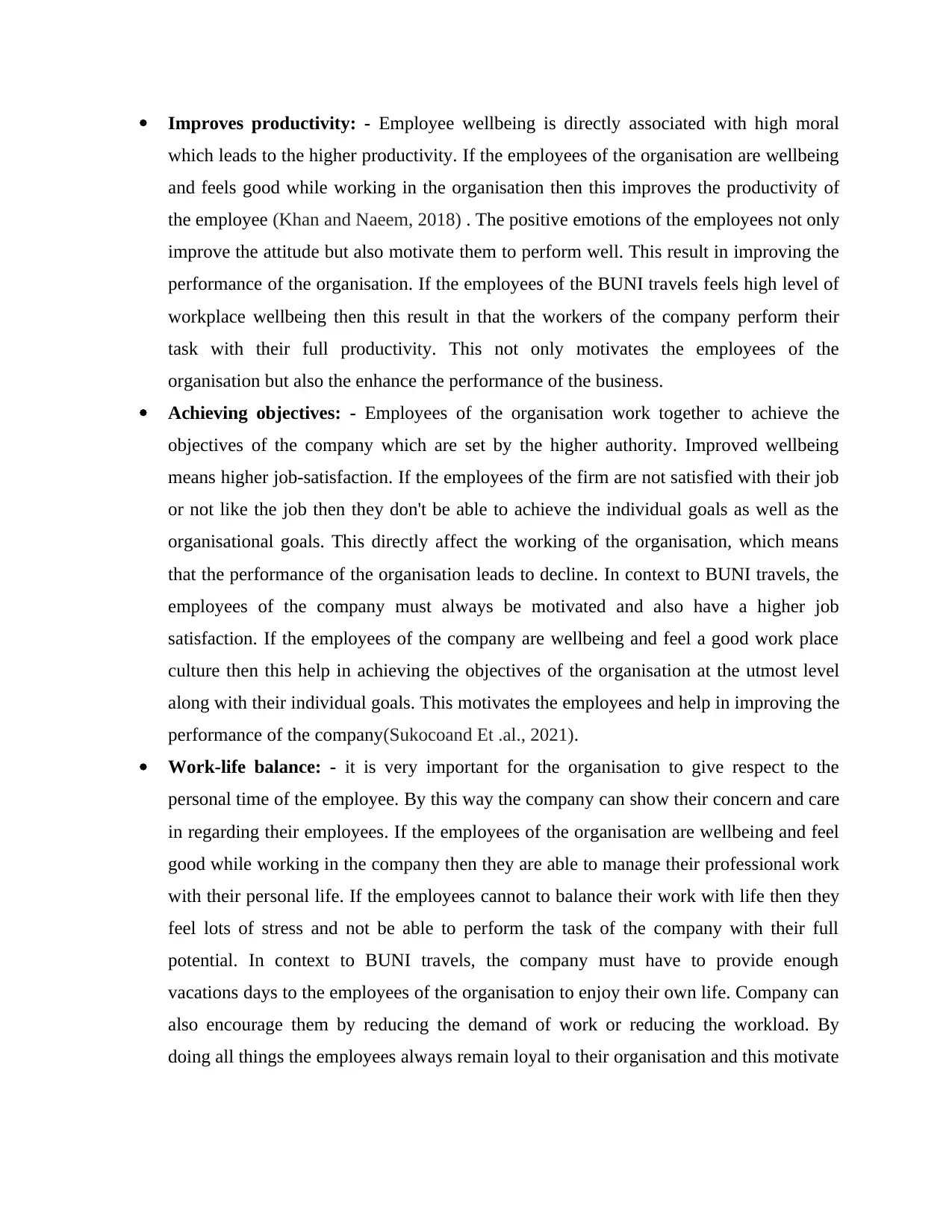
Improves productivity: - Employee wellbeing is directly associated with high moral
which leads to the higher productivity. If the employees of the organisation are wellbeing
and feels good while working in the organisation then this improves the productivity of
the employee (Khan and Naeem, 2018) . The positive emotions of the employees not only
improve the attitude but also motivate them to perform well. This result in improving the
performance of the organisation. If the employees of the BUNI travels feels high level of
workplace wellbeing then this result in that the workers of the company perform their
task with their full productivity. This not only motivates the employees of the
organisation but also the enhance the performance of the business.
Achieving objectives: - Employees of the organisation work together to achieve the
objectives of the company which are set by the higher authority. Improved wellbeing
means higher job-satisfaction. If the employees of the firm are not satisfied with their job
or not like the job then they don't be able to achieve the individual goals as well as the
organisational goals. This directly affect the working of the organisation, which means
that the performance of the organisation leads to decline. In context to BUNI travels, the
employees of the company must always be motivated and also have a higher job
satisfaction. If the employees of the company are wellbeing and feel a good work place
culture then this help in achieving the objectives of the organisation at the utmost level
along with their individual goals. This motivates the employees and help in improving the
performance of the company(Sukocoand Et .al., 2021).
Work-life balance: - it is very important for the organisation to give respect to the
personal time of the employee. By this way the company can show their concern and care
in regarding their employees. If the employees of the organisation are wellbeing and feel
good while working in the company then they are able to manage their professional work
with their personal life. If the employees cannot to balance their work with life then they
feel lots of stress and not be able to perform the task of the company with their full
potential. In context to BUNI travels, the company must have to provide enough
vacations days to the employees of the organisation to enjoy their own life. Company can
also encourage them by reducing the demand of work or reducing the workload. By
doing all things the employees always remain loyal to their organisation and this motivate
which leads to the higher productivity. If the employees of the organisation are wellbeing
and feels good while working in the organisation then this improves the productivity of
the employee (Khan and Naeem, 2018) . The positive emotions of the employees not only
improve the attitude but also motivate them to perform well. This result in improving the
performance of the organisation. If the employees of the BUNI travels feels high level of
workplace wellbeing then this result in that the workers of the company perform their
task with their full productivity. This not only motivates the employees of the
organisation but also the enhance the performance of the business.
Achieving objectives: - Employees of the organisation work together to achieve the
objectives of the company which are set by the higher authority. Improved wellbeing
means higher job-satisfaction. If the employees of the firm are not satisfied with their job
or not like the job then they don't be able to achieve the individual goals as well as the
organisational goals. This directly affect the working of the organisation, which means
that the performance of the organisation leads to decline. In context to BUNI travels, the
employees of the company must always be motivated and also have a higher job
satisfaction. If the employees of the company are wellbeing and feel a good work place
culture then this help in achieving the objectives of the organisation at the utmost level
along with their individual goals. This motivates the employees and help in improving the
performance of the company(Sukocoand Et .al., 2021).
Work-life balance: - it is very important for the organisation to give respect to the
personal time of the employee. By this way the company can show their concern and care
in regarding their employees. If the employees of the organisation are wellbeing and feel
good while working in the company then they are able to manage their professional work
with their personal life. If the employees cannot to balance their work with life then they
feel lots of stress and not be able to perform the task of the company with their full
potential. In context to BUNI travels, the company must have to provide enough
vacations days to the employees of the organisation to enjoy their own life. Company can
also encourage them by reducing the demand of work or reducing the workload. By
doing all things the employees always remain loyal to their organisation and this motivate
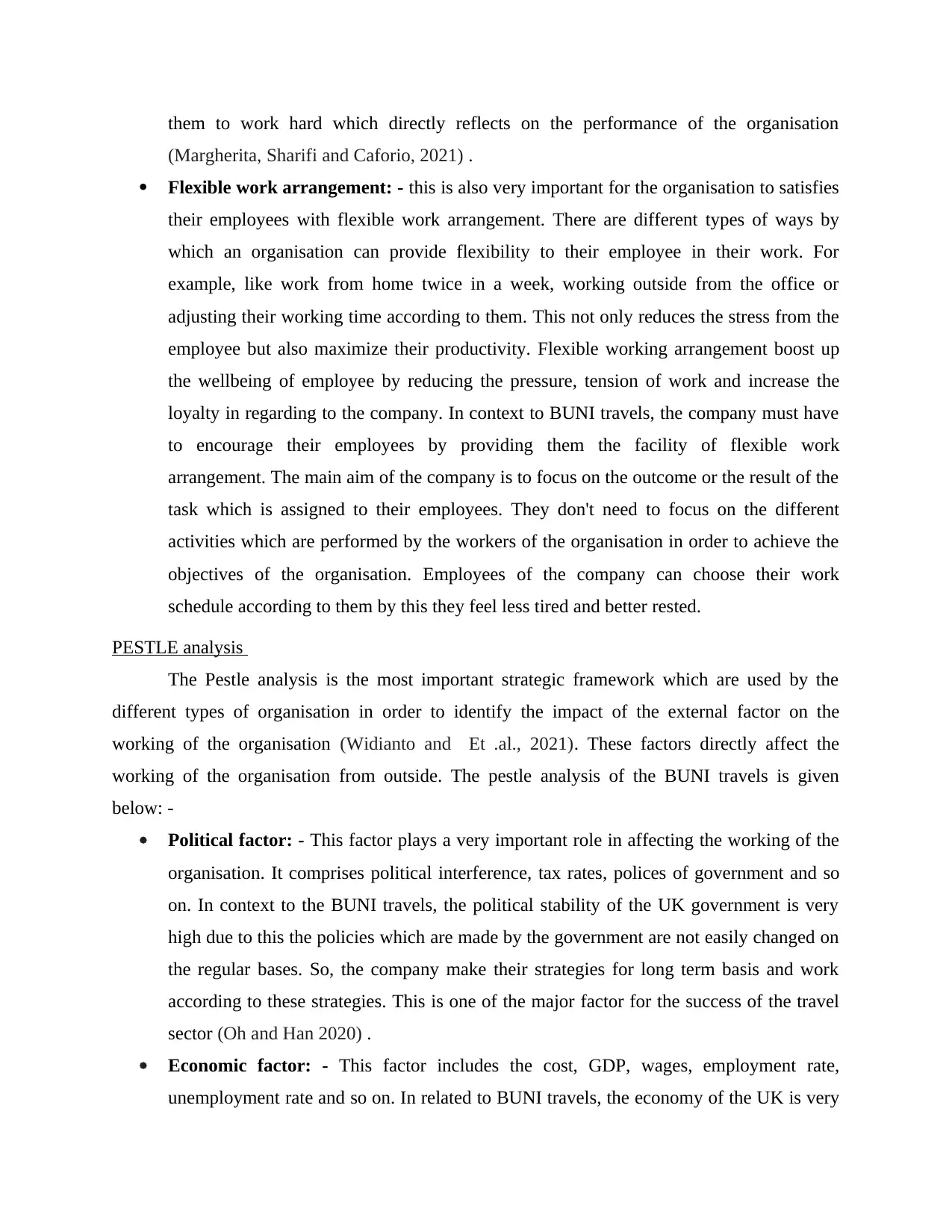
them to work hard which directly reflects on the performance of the organisation
(Margherita, Sharifi and Caforio, 2021) .
Flexible work arrangement: - this is also very important for the organisation to satisfies
their employees with flexible work arrangement. There are different types of ways by
which an organisation can provide flexibility to their employee in their work. For
example, like work from home twice in a week, working outside from the office or
adjusting their working time according to them. This not only reduces the stress from the
employee but also maximize their productivity. Flexible working arrangement boost up
the wellbeing of employee by reducing the pressure, tension of work and increase the
loyalty in regarding to the company. In context to BUNI travels, the company must have
to encourage their employees by providing them the facility of flexible work
arrangement. The main aim of the company is to focus on the outcome or the result of the
task which is assigned to their employees. They don't need to focus on the different
activities which are performed by the workers of the organisation in order to achieve the
objectives of the organisation. Employees of the company can choose their work
schedule according to them by this they feel less tired and better rested.
PESTLE analysis
The Pestle analysis is the most important strategic framework which are used by the
different types of organisation in order to identify the impact of the external factor on the
working of the organisation (Widianto and Et .al., 2021). These factors directly affect the
working of the organisation from outside. The pestle analysis of the BUNI travels is given
below: -
Political factor: - This factor plays a very important role in affecting the working of the
organisation. It comprises political interference, tax rates, polices of government and so
on. In context to the BUNI travels, the political stability of the UK government is very
high due to this the policies which are made by the government are not easily changed on
the regular bases. So, the company make their strategies for long term basis and work
according to these strategies. This is one of the major factor for the success of the travel
sector (Oh and Han 2020) .
Economic factor: - This factor includes the cost, GDP, wages, employment rate,
unemployment rate and so on. In related to BUNI travels, the economy of the UK is very
(Margherita, Sharifi and Caforio, 2021) .
Flexible work arrangement: - this is also very important for the organisation to satisfies
their employees with flexible work arrangement. There are different types of ways by
which an organisation can provide flexibility to their employee in their work. For
example, like work from home twice in a week, working outside from the office or
adjusting their working time according to them. This not only reduces the stress from the
employee but also maximize their productivity. Flexible working arrangement boost up
the wellbeing of employee by reducing the pressure, tension of work and increase the
loyalty in regarding to the company. In context to BUNI travels, the company must have
to encourage their employees by providing them the facility of flexible work
arrangement. The main aim of the company is to focus on the outcome or the result of the
task which is assigned to their employees. They don't need to focus on the different
activities which are performed by the workers of the organisation in order to achieve the
objectives of the organisation. Employees of the company can choose their work
schedule according to them by this they feel less tired and better rested.
PESTLE analysis
The Pestle analysis is the most important strategic framework which are used by the
different types of organisation in order to identify the impact of the external factor on the
working of the organisation (Widianto and Et .al., 2021). These factors directly affect the
working of the organisation from outside. The pestle analysis of the BUNI travels is given
below: -
Political factor: - This factor plays a very important role in affecting the working of the
organisation. It comprises political interference, tax rates, polices of government and so
on. In context to the BUNI travels, the political stability of the UK government is very
high due to this the policies which are made by the government are not easily changed on
the regular bases. So, the company make their strategies for long term basis and work
according to these strategies. This is one of the major factor for the success of the travel
sector (Oh and Han 2020) .
Economic factor: - This factor includes the cost, GDP, wages, employment rate,
unemployment rate and so on. In related to BUNI travels, the economy of the UK is very
⊘ This is a preview!⊘
Do you want full access?
Subscribe today to unlock all pages.

Trusted by 1+ million students worldwide
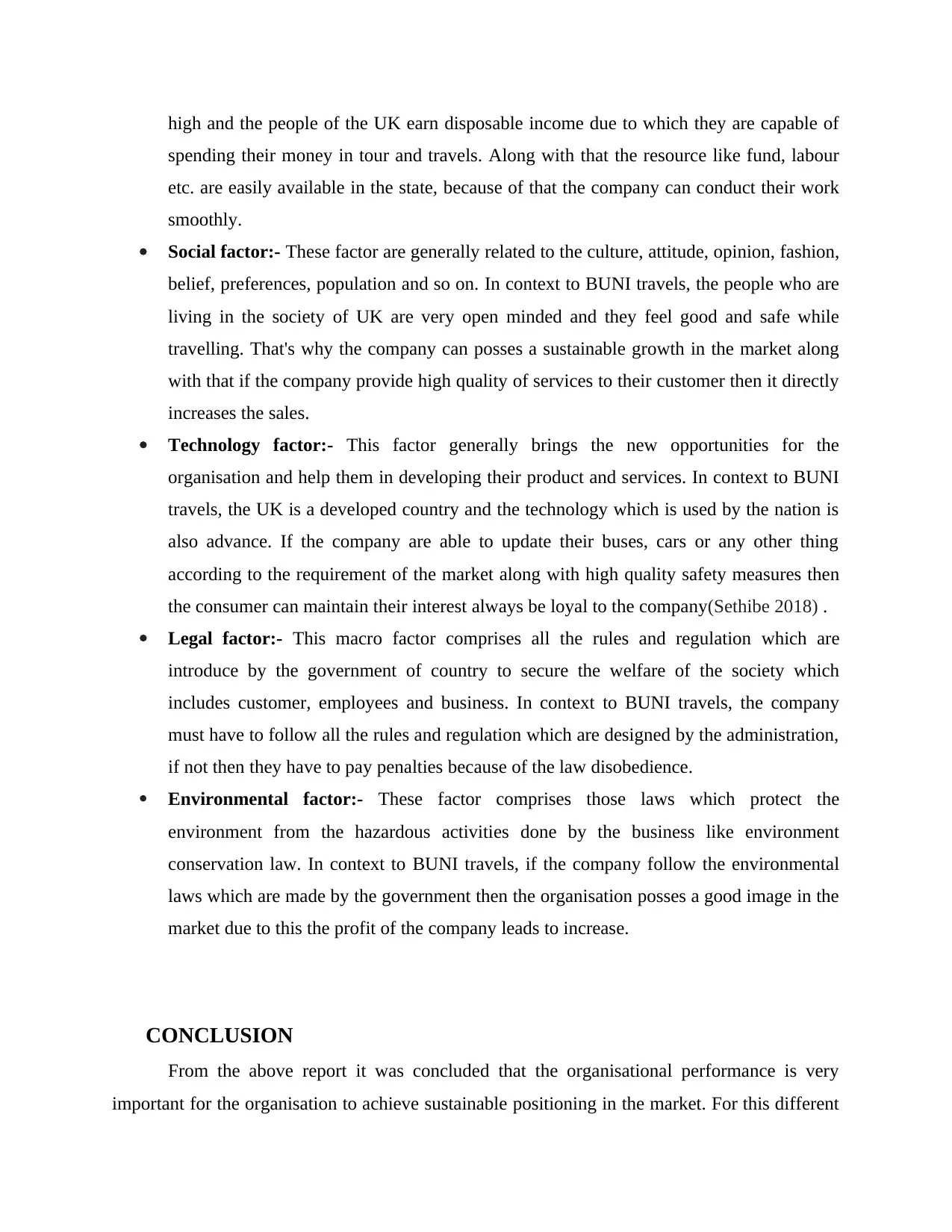
high and the people of the UK earn disposable income due to which they are capable of
spending their money in tour and travels. Along with that the resource like fund, labour
etc. are easily available in the state, because of that the company can conduct their work
smoothly.
Social factor:- These factor are generally related to the culture, attitude, opinion, fashion,
belief, preferences, population and so on. In context to BUNI travels, the people who are
living in the society of UK are very open minded and they feel good and safe while
travelling. That's why the company can posses a sustainable growth in the market along
with that if the company provide high quality of services to their customer then it directly
increases the sales.
Technology factor:- This factor generally brings the new opportunities for the
organisation and help them in developing their product and services. In context to BUNI
travels, the UK is a developed country and the technology which is used by the nation is
also advance. If the company are able to update their buses, cars or any other thing
according to the requirement of the market along with high quality safety measures then
the consumer can maintain their interest always be loyal to the company(Sethibe 2018) .
Legal factor:- This macro factor comprises all the rules and regulation which are
introduce by the government of country to secure the welfare of the society which
includes customer, employees and business. In context to BUNI travels, the company
must have to follow all the rules and regulation which are designed by the administration,
if not then they have to pay penalties because of the law disobedience.
Environmental factor:- These factor comprises those laws which protect the
environment from the hazardous activities done by the business like environment
conservation law. In context to BUNI travels, if the company follow the environmental
laws which are made by the government then the organisation posses a good image in the
market due to this the profit of the company leads to increase.
CONCLUSION
From the above report it was concluded that the organisational performance is very
important for the organisation to achieve sustainable positioning in the market. For this different
spending their money in tour and travels. Along with that the resource like fund, labour
etc. are easily available in the state, because of that the company can conduct their work
smoothly.
Social factor:- These factor are generally related to the culture, attitude, opinion, fashion,
belief, preferences, population and so on. In context to BUNI travels, the people who are
living in the society of UK are very open minded and they feel good and safe while
travelling. That's why the company can posses a sustainable growth in the market along
with that if the company provide high quality of services to their customer then it directly
increases the sales.
Technology factor:- This factor generally brings the new opportunities for the
organisation and help them in developing their product and services. In context to BUNI
travels, the UK is a developed country and the technology which is used by the nation is
also advance. If the company are able to update their buses, cars or any other thing
according to the requirement of the market along with high quality safety measures then
the consumer can maintain their interest always be loyal to the company(Sethibe 2018) .
Legal factor:- This macro factor comprises all the rules and regulation which are
introduce by the government of country to secure the welfare of the society which
includes customer, employees and business. In context to BUNI travels, the company
must have to follow all the rules and regulation which are designed by the administration,
if not then they have to pay penalties because of the law disobedience.
Environmental factor:- These factor comprises those laws which protect the
environment from the hazardous activities done by the business like environment
conservation law. In context to BUNI travels, if the company follow the environmental
laws which are made by the government then the organisation posses a good image in the
market due to this the profit of the company leads to increase.
CONCLUSION
From the above report it was concluded that the organisational performance is very
important for the organisation to achieve sustainable positioning in the market. For this different
Paraphrase This Document
Need a fresh take? Get an instant paraphrase of this document with our AI Paraphraser
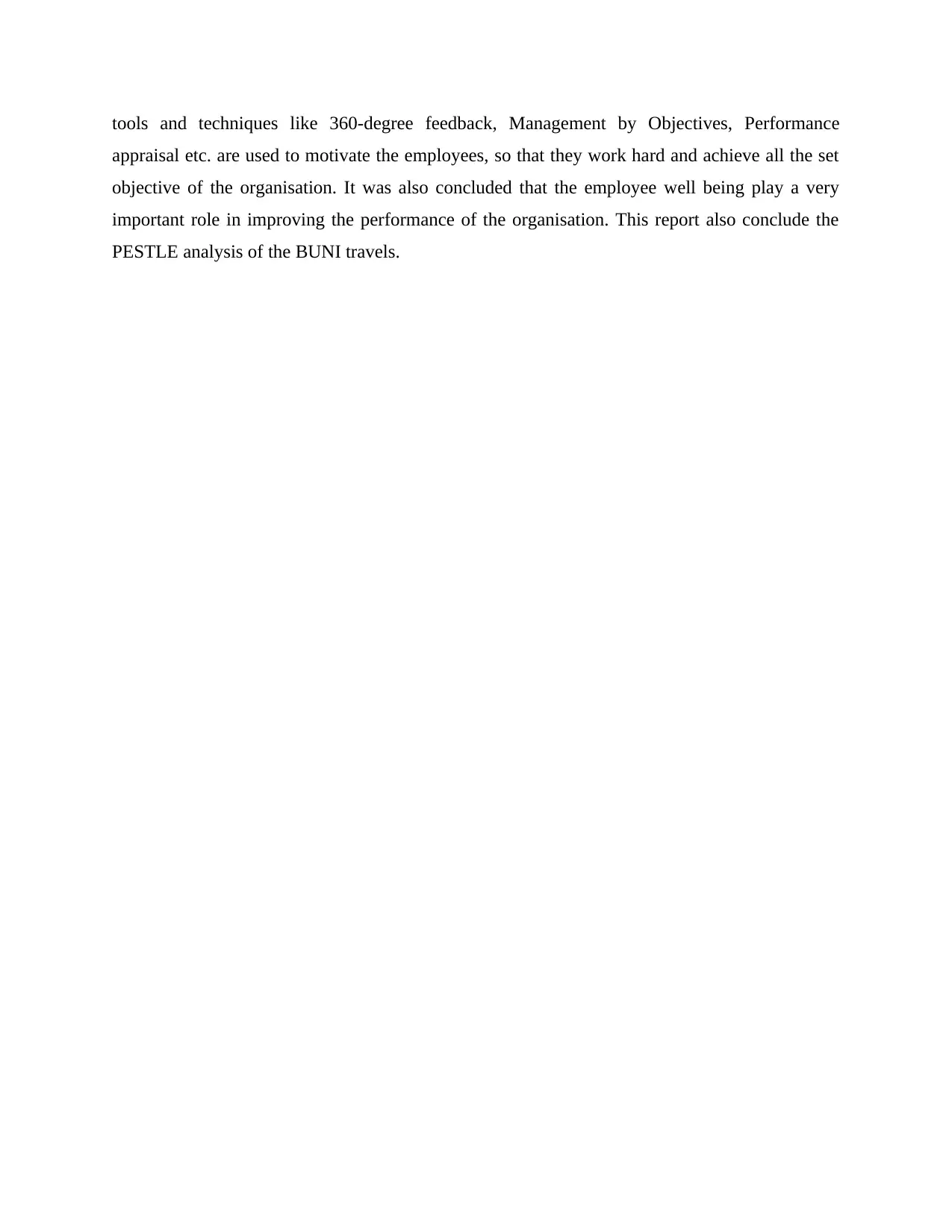
tools and techniques like 360-degree feedback, Management by Objectives, Performance
appraisal etc. are used to motivate the employees, so that they work hard and achieve all the set
objective of the organisation. It was also concluded that the employee well being play a very
important role in improving the performance of the organisation. This report also conclude the
PESTLE analysis of the BUNI travels.
appraisal etc. are used to motivate the employees, so that they work hard and achieve all the set
objective of the organisation. It was also concluded that the employee well being play a very
important role in improving the performance of the organisation. This report also conclude the
PESTLE analysis of the BUNI travels.
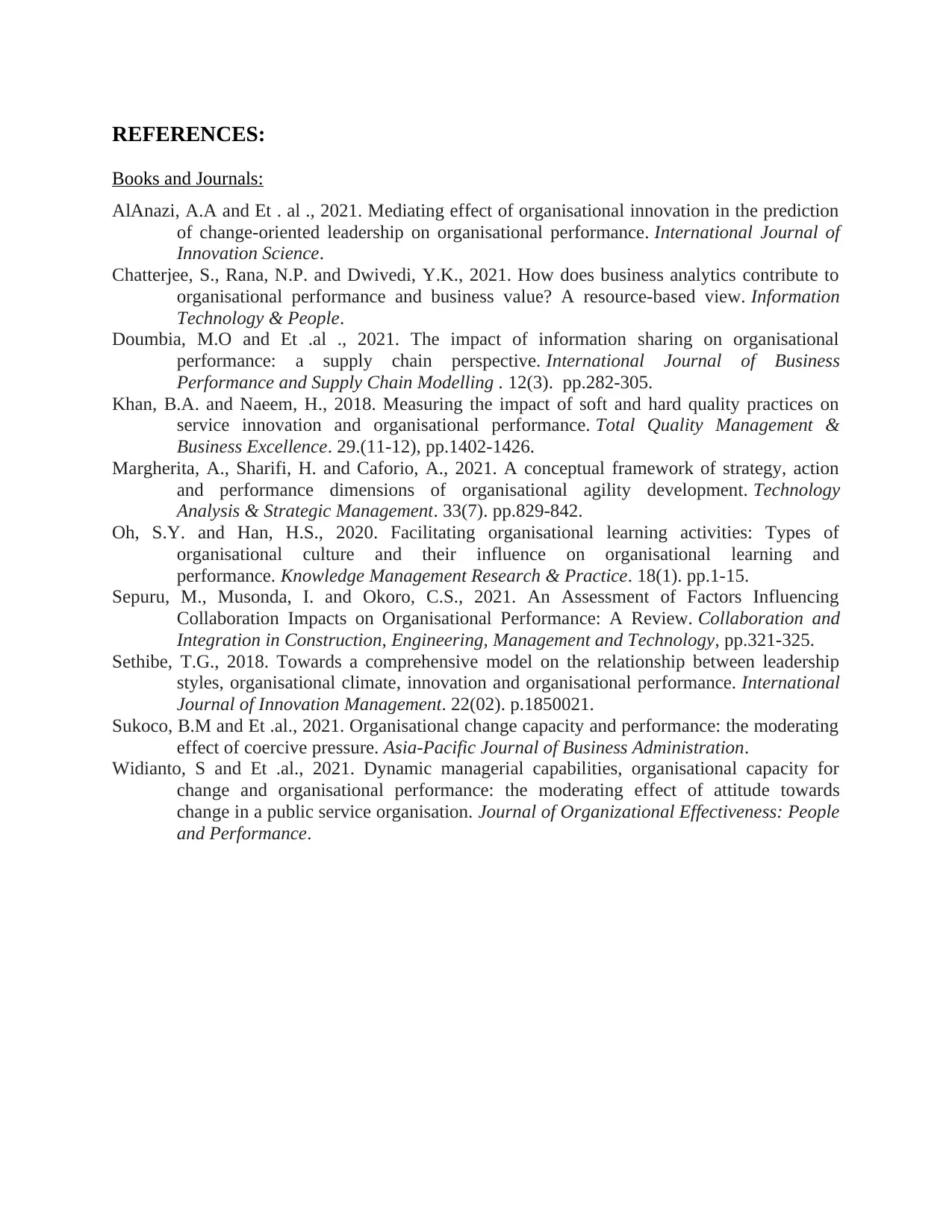
REFERENCES:
Books and Journals:
AlAnazi, A.A and Et . al ., 2021. Mediating effect of organisational innovation in the prediction
of change-oriented leadership on organisational performance. International Journal of
Innovation Science.
Chatterjee, S., Rana, N.P. and Dwivedi, Y.K., 2021. How does business analytics contribute to
organisational performance and business value? A resource-based view. Information
Technology & People.
Doumbia, M.O and Et .al ., 2021. The impact of information sharing on organisational
performance: a supply chain perspective. International Journal of Business
Performance and Supply Chain Modelling . 12(3). pp.282-305.
Khan, B.A. and Naeem, H., 2018. Measuring the impact of soft and hard quality practices on
service innovation and organisational performance. Total Quality Management &
Business Excellence. 29.(11-12), pp.1402-1426.
Margherita, A., Sharifi, H. and Caforio, A., 2021. A conceptual framework of strategy, action
and performance dimensions of organisational agility development. Technology
Analysis & Strategic Management. 33(7). pp.829-842.
Oh, S.Y. and Han, H.S., 2020. Facilitating organisational learning activities: Types of
organisational culture and their influence on organisational learning and
performance. Knowledge Management Research & Practice. 18(1). pp.1-15.
Sepuru, M., Musonda, I. and Okoro, C.S., 2021. An Assessment of Factors Influencing
Collaboration Impacts on Organisational Performance: A Review. Collaboration and
Integration in Construction, Engineering, Management and Technology, pp.321-325.
Sethibe, T.G., 2018. Towards a comprehensive model on the relationship between leadership
styles, organisational climate, innovation and organisational performance. International
Journal of Innovation Management. 22(02). p.1850021.
Sukoco, B.M and Et .al., 2021. Organisational change capacity and performance: the moderating
effect of coercive pressure. Asia-Pacific Journal of Business Administration.
Widianto, S and Et .al., 2021. Dynamic managerial capabilities, organisational capacity for
change and organisational performance: the moderating effect of attitude towards
change in a public service organisation. Journal of Organizational Effectiveness: People
and Performance.
Books and Journals:
AlAnazi, A.A and Et . al ., 2021. Mediating effect of organisational innovation in the prediction
of change-oriented leadership on organisational performance. International Journal of
Innovation Science.
Chatterjee, S., Rana, N.P. and Dwivedi, Y.K., 2021. How does business analytics contribute to
organisational performance and business value? A resource-based view. Information
Technology & People.
Doumbia, M.O and Et .al ., 2021. The impact of information sharing on organisational
performance: a supply chain perspective. International Journal of Business
Performance and Supply Chain Modelling . 12(3). pp.282-305.
Khan, B.A. and Naeem, H., 2018. Measuring the impact of soft and hard quality practices on
service innovation and organisational performance. Total Quality Management &
Business Excellence. 29.(11-12), pp.1402-1426.
Margherita, A., Sharifi, H. and Caforio, A., 2021. A conceptual framework of strategy, action
and performance dimensions of organisational agility development. Technology
Analysis & Strategic Management. 33(7). pp.829-842.
Oh, S.Y. and Han, H.S., 2020. Facilitating organisational learning activities: Types of
organisational culture and their influence on organisational learning and
performance. Knowledge Management Research & Practice. 18(1). pp.1-15.
Sepuru, M., Musonda, I. and Okoro, C.S., 2021. An Assessment of Factors Influencing
Collaboration Impacts on Organisational Performance: A Review. Collaboration and
Integration in Construction, Engineering, Management and Technology, pp.321-325.
Sethibe, T.G., 2018. Towards a comprehensive model on the relationship between leadership
styles, organisational climate, innovation and organisational performance. International
Journal of Innovation Management. 22(02). p.1850021.
Sukoco, B.M and Et .al., 2021. Organisational change capacity and performance: the moderating
effect of coercive pressure. Asia-Pacific Journal of Business Administration.
Widianto, S and Et .al., 2021. Dynamic managerial capabilities, organisational capacity for
change and organisational performance: the moderating effect of attitude towards
change in a public service organisation. Journal of Organizational Effectiveness: People
and Performance.
⊘ This is a preview!⊘
Do you want full access?
Subscribe today to unlock all pages.

Trusted by 1+ million students worldwide
1 out of 9
Related Documents
Your All-in-One AI-Powered Toolkit for Academic Success.
+13062052269
info@desklib.com
Available 24*7 on WhatsApp / Email
![[object Object]](/_next/static/media/star-bottom.7253800d.svg)
Unlock your academic potential
Copyright © 2020–2026 A2Z Services. All Rights Reserved. Developed and managed by ZUCOL.

